Don't wanna be here? Send us removal request.
Text

Title: Only the Animals Author: Ceridwen Dovey Date Finished: 19 April 2025 Rating: 3.75/5
After finishing Ted Chiang’s Stories of Your Life and Others, I wanted to continue reading short story collections, and it just so happened that a local book club had chosen Only the Animals for the month.
The first story didn’t particularly resonate with me, though I appreciated the general premise of exploring events from a highly anthropomorphised animal's perspective, especially in the lead-up to their human-caused destruction.
However, I found myself becoming more drawn in as time went on. By the fourth story, I was ‘in’ and knew I’d finish the rest of the book quite easily—though, as with any collection, I definitely enjoyed some stories more than others.
The stories that stood out most to me were those of the Soul of Dog, Tortoise, Elephant, Bear, and Dolphin.
The overarching theme—human warfare and violence, and the collateral suffering it causes not only for people but for animals too—is an important one, and Dovey explores it thoughtfully and effectively.
0 notes
Text

Title: Stories of Your Life and Others Author: Ted Chiang Date Finished: 5 April 2025 Rating: 5/5
I’d been thinking about starting to read short story collections, and Chiang’s Stories of Your Life and Others came up repeatedly as one of the best. I'm so glad I chose it as my first collection to dive into — wow! What an incredible set of stories.
Chiang clearly has a beautiful, imaginative, and intelligent mind. This collection has made me excited to continue reading his work — and to explore more short stories in general. He writes beautifully, explores fascinating topics and ideas, and brings a sense of wonder and awe to stories that could easily feel overly technical or high-tech in less capable hands.
The Tower of Babylon -4.5
A great introduction to the collection with a sense of ancient mythic grandeur. I was so intrigued by the journey, the alternate universe with its distinct physical principles, and the final revelation about the nature of the world and heaven.
Understand – 4/5
Conceptually, this reminded me a bit of the conceot of the film Limitness, But overall, it was an interesting story and makes you try and consider what you yourself might have done if you suddenly became hyperintelligent – but also captures I think the isolating nature of what many ‘gifted’ people may experience among the non-gifted. I thought it was interested that there were two hyperintelligent people with very different values and approached for how that intelligence can and should be used. In this way, it thinks about intelligence as a tool that can be used for various purposes.
Division by Zero – 3/5
This very short story did not quite capture me in the way all of the others did. Maybe I just didn’t ‘get it’.
Story of Your Life – 5/5
An amazing story — complex, mind-bending, and emotionally deep. I had seen the film Arrival before reading this (without knowing it was based on a short story), so I knew many key aspects, but it was still an extremely rewarding read. I loved the exploration of different perceptions of time — linear, cyclical, simultaneous — and the way linguistics was woven into the very experience of reality.
Seventy-Two Letters (4.5/5)
This steampunk-esque story confused me a little at first, particularly around the concept of golems and the magical properties of letters. But once I understood the mechanics, I really enjoyed it.
Beyond the fascinating worldbuilding, the story offers a strong commentary on automation and its impact on labor and society, which feels especially resonant today with current debates around AI. However, Chiang goes even deeper: the story explores how scientific advancements are not inherently good or evil, but are often politicised and weaponised by those in power.
The protagonist’s attempt to solve an existential threat becomes a tool for the elites to promote eugenicist ideologies and reinforce class hierarchies.
Thus, the story highlights not only human ingenuity, but also the corruption of systems that manipulate innovation to serve oppressive, exclusionary agendas. It isn’t magic or automation that is flawed — it’s how human structures of power twist them toward injustice.
Hell is the Absence of God (3.5/5)
An interesting story set in a world where God and angels are undoubtedly real but often destructive. It wrestles with many real-world doubts around religion — but raises the stakes by making them observable phenomena. Although it was a thought-provoking concept, it didn’t 'click' with me as strongly as some of the other stories.
Liking What You See (5/5)
I really loved this story, perhaps because the broader theme feels so personally resonant. As someone who has struggled with both internal (e.g., self-esteem, body image) and external (e.g., prejudice, bullying) experiences around appearance, the idea of eliminating visual beauty bias was deeply intriguing — and quietly appealing.
What I appreciated most was Chiang’s nuanced handling of the issue: he provides well-reasoned arguments on both sides of the debate, showing how deeply entrenched beauty standards are — not just socially, but politically and economically.
The story highlights how the system co-opts beauty as a tool for manipulation, persuasion, and marketing, and how even when the overt mechanisms of control are challenged, the system quickly adapts to preserve its influence. It made me reflect on how the concept of beauty itself has been politicised, commodified, and weaponised against people — and how resisting that manipulation is complex, not straightforward.
1 note
·
View note
Text
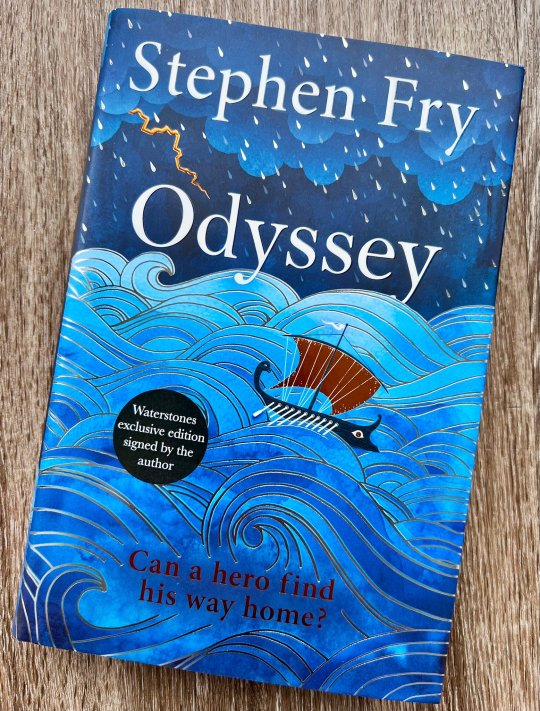
Title: Odyssey Author: Stephen Fry Date Finished: 4 April 2025 Rating: 4/5
Once again, Fry doesn’t disappoint. As I mentioned in my previous review, Fry is a master storyteller, offering an accessible and engaging format that draws contemporary readers into the world of Greek myth.
Like Troy, this book takes a more chronological, overarching approach compared to Heroes and Mythos — a style that works well for the story it documents.
It was also nice to become more acquainted with the story of The Odyssey, as Odysseus has always been the ‘hero’ I’ve been most drawn to — perhaps because he is known for his intelligence and cunning. It was satisfying to finally understand the bigger narrative, rather than just the scattered snippets I was familiar with before.
#book review#reading journal#reading diary#book journal#book diary#reading#greek myth#mythology#stephen fry
1 note
·
View note
Text
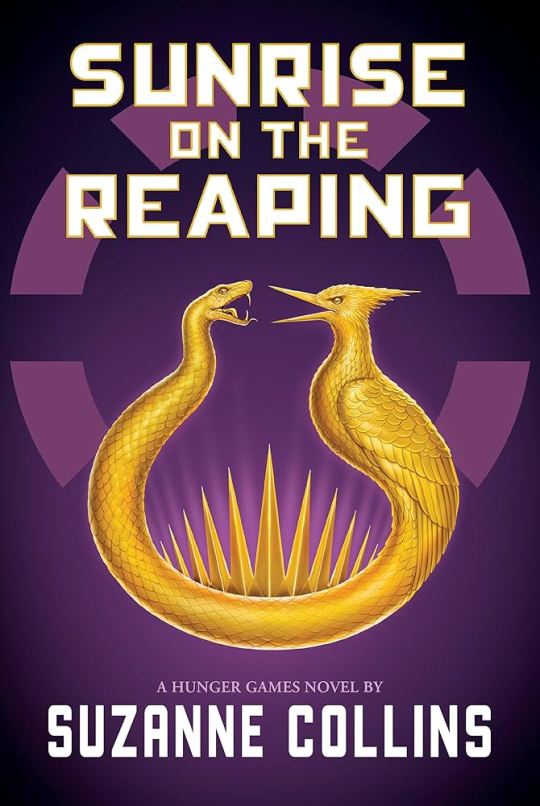
Title: Sunrise on the Reaping Author: Suzanne Collins Finished on: 22 March 2025 Rating: 3/5
*Spoiler Alert*
I had been anxiously awaiting the release of Sunrise on the Reaping with excitement and anticipation since it was first announced. I even pre-ordered it to ensure I could read it as soon as possible and cleared my schedule so I could binge the entire book upon release. While I found it easy to read and enjoyable enough, I have to admit I was ultimately disappointed. Compared to the original trilogy, which I love, and The Ballad of Songbirds and Snakes, which I liked, this novel is, unfortunately, just "okay." Seeing the overwhelmingly positive reviews made me question my own reaction, so I gave it a second chance by listening to the audiobook almost immediately after reading the physical copy. While I enjoyed the experience more in audio format, my overall feelings about the book remained unchanged.
Haymitch as a protagonist was one of my biggest draws to this book. I’ve always loved his character in the original trilogy, and Woody Harrelson’s portrayal in the films only deepened that appreciation. I was eager to learn more about his backstory, and while I enjoyed aspects of his character in this novel, he wasn’t as engaging as I had hoped. His cynicism and sarcasm—defining traits in the original books—are slightly present here, but he is, understandably, a different person as a young man. This makes sense given the immense trauma he has yet to experience, but his character still could have had more to it. He often felt too simple for someone who would later become such a layered and complex figure.
Perhaps the issue is that Haymitch is actually very similar to Katniss—they are both from the Seam, both have an innocent younger sibling they feel responsible for, both lost their fathers to the mining industry, both operate outside the rules to survive, both spend time in the woods, both have a practical, resourceful and independent nature, both are close to a peer (Gale and Lenore) with a more explicit rebellious streak, and both demonstrate a tendency toward justice, protecting others and purposeful defiance. The biggest difference is that young Haymitch is generally more pro-social, whereas Katniss is more standoffish and reclusive, and that Katniss is especially talented with a lethal weapon. While I always appreciate that these similarities are intentional and act as a foundation to their unique bond in the trilogy which I enjoy immensely, in this context, perhaps this protagonist archetype and arc just feel too familiar, like it’s already been done, like Haymitch’s ‘essence’ is not developed or distinct enough. Additionally, I could have done with fewer reminiscences about Lenore Dove (despite liking her character generally).
Several new characters, particularly Ampert, LouLou, Wyatt, and Maysilee, stood out. I only wish we had spent more time with the first three. The introduction of the Newcomers alliance was an interesting and fresh addition to the story, but I found it odd that Collins chose to separate Haymitch from them so early. While Catching Fire also features an alliance, Katniss is mainly unaware of its intricacies, meaning we never get a deep dive into the mechanics of strategy and trust-building. If Haymitch had remained part of the Newcomers, even for a portion of the Games, we could have explored their strategies, conflicts, and teamwork more meaningfully. This would have allowed us to develop stronger emotional connections to key characters, making their eventual downfall more impactful. Alternatively, if the plan was always for the alliance to fail in the initial bloodbath, having Haymitch involved from the start would have heightened the stakes and made their loss feel more significant.
I didn’t mind the reintroduction of familiar characters like Beetee, Wiress, Mags, and Plutarch. I enjoyed spending more time getting to know them. I especially enjoyed getting to know Wiress a little better. While some might view their presence as mere fan service, I thought their inclusion felt organic. Given that the novel delves into the early rumblings of a future rebellion where Haymitch, Plutarch and the other victors have orchestrated the beginning of a full-scale revolution in escaping the arena in Catching Fire, it makes complete sense that these people will have worked together and had time to get to know one another and solidify trust in the past. However, I was slightly disappointed with how Plutarch’s arc was handled. He is already a rebel collaborator in this book, but I would have found it more compelling to see how he became radicalised. As someone born into privilege and wealth, his journey to rebellion could have been fascinating.
One revelation I did enjoy was the confirmation that Katniss is descended from the Covey on her father’s side—something many fans had already speculated. While some may view the connection between Haymitch and Katniss’s father as contrived, I found it believable. In a small district like 12, particularly within the Seam, it makes sense that two rebellious young men of the same age would know each other. That said, Effie’s inclusion felt unnecessary and purely like fan service.
One of the book’s biggest flaws is its overly familiar structure without a particularly fresh take. This is the fourth novel in the series to feature a Hunger Games, following the same format of reaping, preparation, arena, and aftermath. The original introduced us to the concept, Catching Fire raised the stakes by pitting Katniss against experienced victors and delivering a major revolutionary twist, and A Ballad of Songbirds and Snakes offered a fresh perspective by showing the Games through the eyes of a Capitol mentor. But Sunrise on the Reaping simply presents another tribute’s point of view. While the story itself isn’t uninteresting, the reader’s prior knowledge makes it feel predictable and lacking in meaningful tension. Haymitch’s desire to "break the Games" could have been a compelling source of suspense, but since we already know he ultimately fails, much of the impact is lost. In fact, every major plot beat is already laid out in the original trilogy: Haymitch wins, the Games continue, the Capitol retaliates against his loved ones, and he is left broken. Other key moments—the axe rebounding to take out Silka, Maysilee’s death, the volcanic eruption, the idyllic setting, the poison, and even some of the mutts—are all events we already know. While the finer details and unexpected twists in this retelling may add some intrigue, they aren’t enough to make the story truly gripping or surprising. Spending more time with Haymitch in the aftermath of the Games, delving deeper into his experience as a mentor, might have provided a fresher perspective and a more nuanced exploration of his transformation, but the aftermath feels quickly glossed over.
Similarly, the book’s themes—political power and corruption, tyranny and fascism, oppression, inequality, media manipulation and propaganda, consumerism, privilege, resistance, as well as survival, resilience, resourcefulness, community, friendship, family, altruism, and sacrifice—are not new to the series. While still important, I do feel they were explored more effectively in previous books. Additionally, the writing often felt more overt, more ‘on the nose’, relying on telling rather than showing. A subtler approach would have been appreciated.
In terms of world-building, the novel doesn’t add much. The Capitol and districts feel nearly identical to their depictions in the original trilogy, albeit slightly less refined. The fast pacing also worked against the book. Given that the plot doesn’t introduce much new material, a deeper exploration of characters, relationships, and the emotional weight of events could have made it more engaging. Instead of rushing from one moment to the next, lingering on key developments would have allowed for greater emotional resonance. I would have happily read a version of this book that was 50% longer if it had meant more nuance and depth.
I will say that there are some truly shocking moments of horror that drive home the sadistic nature of the Capitol regime. Firstly, the Capitol’s orchestration of Ampert’s brutal death—who, I will remind you, is a 12-year-old child—being eaten alive down to the skeleton by a pack of carnivorous squirrels. And secondly, the introduction of LouLou—a young girl who has been surgically modified to look like Louella, is being drugged and controlled with an implant, has likely experienced other horrors in Capitol custody, and who is allowed to die painfully by poisoning when the Capitol could easily release a sedative to ease her suffering. The Capitol’s disregard for human life, including that of children, is already well established—they send children to fight to the death yearly, bomb hospitals and towns filled with innocents, and auction young tributes to the highest bidder. But Ampert’s and LouLou’s stories hammer in the Capitol’s intentionally orchestrated brutality against its most innocent, demonstrating cruelty that is deliberately designed for them rather than incidental.
Another impactful moment for me, albeit brief, is when both Maysilee and Maritte target the Gamemakers. This felt powerful—a moment of unification between the career districts and the newcomer districts against the ‘real enemy’—a moment that ultimately cost both Maysilee and Maritte their lives. This reinforces that despite the Capitol’s efforts to divide the districts, the real gap is between the Capitol and the districts, and no amount of privilege will truly protect those in the career districts from the Capitol’s cruelty.
As a final thought, I would have loved to see a novel from Plutarch’s perspective. His story would offer a fresh lens—neither tribute nor mentor, but a Gamemaker—exploring how someone embedded in the Capitol’s elite becomes disillusioned and ultimately turns against the system. While A Ballad of Songbirds and Snakes showed us a Capitol citizen who embraced the Games, Plutarch’s journey could reveal the opposite. Such a perspective would also provide meaningful commentary on contemporary society, as most Hunger Games readers are far closer to Capitol citizens than to the oppressed districts. Exploring how someone in a position of privilege unlearns their conditioning and chooses resistance against the very system that affords them their privilege would be a powerful and unique addition to the series—one with a compelling real-world message.
Ultimately, Sunrise on the Reaping is an okay book. It’s engaging enough, the characters are likable enough, it’s action-packed, and it offers some interesting new details about Panem and the lives of those we met in the original trilogy. Perhaps I set myself up with my own high expectations, but as my ramblings suggest, I was mostly let down by how much potential this book had but failed to fully realise. This leaves me concerned about the future of the series. If there are more additions to come, I believe Collins needs to step up her game to preserve the integrity of a series that has always had powerful political, social, and cultural commentary. While I’m not opposed to its commercialisation, it must retain its political heart and be written with deep care if it is to avoid becoming a hollow cash grab.
1 note
·
View note
Text
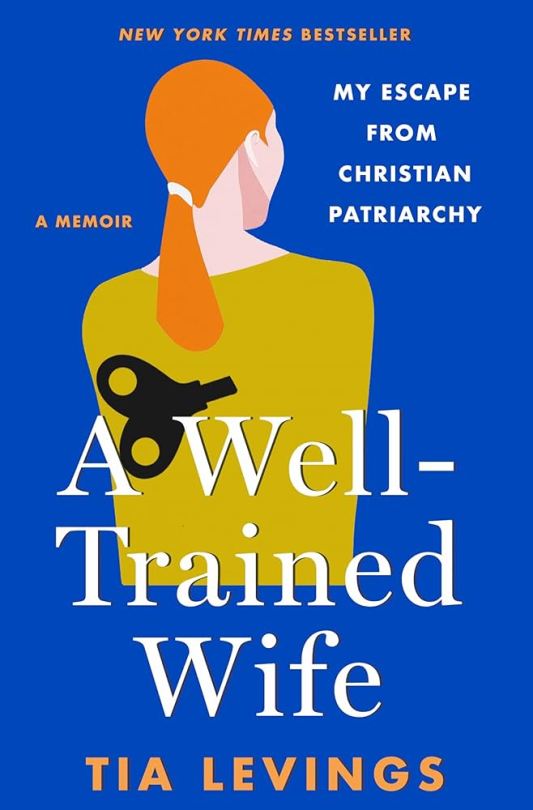
Here’s your revised review with the requested change:
Title: A Well-Trained Wife: My Escape from Christian Patriarchy Author: Tia Levings Date Finished: March 7, 2025 Rating: 4/5
With the rise of Christian nationalism, far-right politics, misogyny, and the rollback of policies protecting women’s rights, this book felt especially relevant. I had heard good things about it, and it did not disappoint.
Tia Levings immerses the reader in her story. As someone who did not grow up in a religious household, I sometimes find it hard to understand how people get drawn into strict religious belief systems—especially those that are severe, oppressive, and repressive. But Levings’ narration makes it clear. She illustrates both the aggressive and manipulative methods used to indoctrinate individuals and how certain life experiences can make someone more vulnerable to them—whether it’s being bullied and yearning for belonging, moving to a new place and seeking community, or experiencing sexual assault and searching for safety and protection.
This book is deeply uncomfortable—but it’s supposed to be. We are meant to feel pained when Tia doesn’t speak out (even as we fully understand why she doesn’t). We are meant to feel anger and betrayal when she is told her abuse is her fault and that she must be more submissive. We are meant to feel fear for her safety, frustration that her loving family doesn’t seem to notice, and horror at the lessons being taught to children, young men, and young women in these church communities. We are meant to feel devastated by the losses Tia endures—of herself, her baby, her pet.
The book offers an important insight into how strict religious communities that operate through hierarchy and oppression impact not only women like Tia, but also men like Allan and the children. Yet, it also highlights the possibility of escape, growth, re-learning, and healing—even if the ending isn’t picture-perfect, because real life rarely is.
An overall powerful and thought-provoking read.
0 notes
Text

Title: Rocannon’s World Author: Ursula K. Le Guin Date Finished: 5 March 2025 Rating: 3.5/4
I had often heard Ursula K. Le Guin recommended as a must-read sci-fi and speculative fiction writer. Wanting to explore her Hainish Cycle, I decided to read the books in order of publication—starting with Rocannon’s World.
Though short and fast-paced, Le Guin effectively builds a world vivid enough to immerse me in this unfamiliar setting. The various races and creatures are intriguing, making the journey feel rich despite the book’s brevity. The plot is simple but compelling, and I enjoyed several characters—even if we didn’t get to spend much time with them—including Semley, Rocannon, Yahon, and Kyo.
I usually crave more detail—especially when exploring unfamiliar worlds and cultures—maybe that’s the sociologist in me. Still, I could appreciate this book for what it was. The one aspect I wished had been developed further was the emotional depth. For example, Rocannon loses his entire crew—an obviously traumatic experience. While the story acknowledges that this fuels his desire for revenge, the writing doesn’t do enough to make us feel his grief. The emotional weight of events often feels muted. This also applies to other events that should feel devastating—such as the deaths of Rocannon's traveling companions and the immense grief Kyo must feel after losing his entire village.
Overall, a good, short read. While not mind- or world-altering, it was engaging enough to make me want to continue exploring Le Guin’s other works.
1 note
·
View note
Text
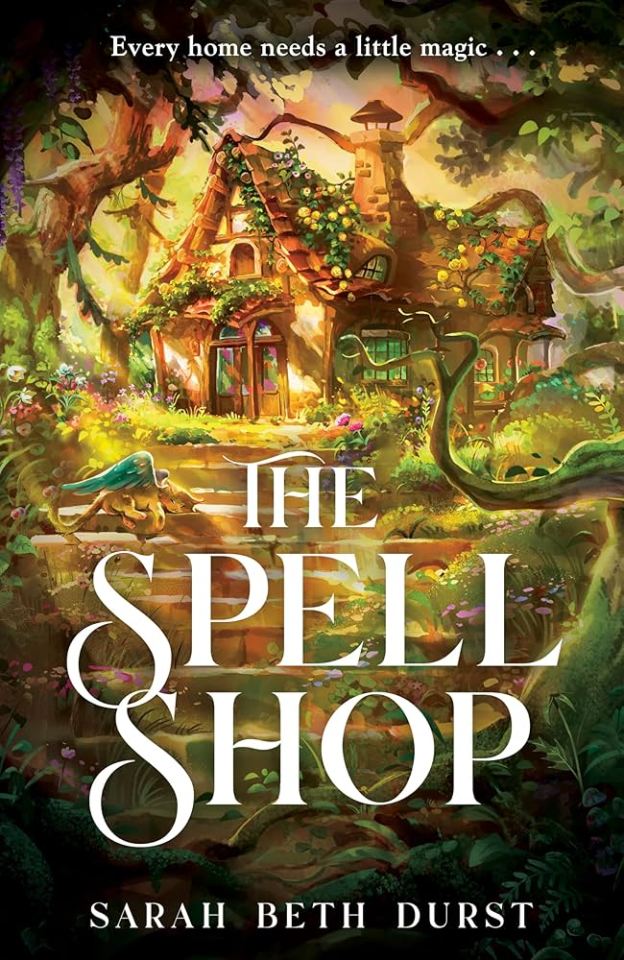
Title: The Spellshop Author: Sarah Beth Durst Finished: 28 February 2025 Rating: 2.5/5
I chose this book as part of the ‘Sweet and Spicy’ challenge on Goodreads, which features popular romance novels. As romance is my least favourite genre, I approached this with low expectations and tried to pick something that sounded cozy and had other appealing elements. I settled on The Spellshop, but despite my modest hopes, I was still disappointed.
The premise was promising: an introverted librarian obsessed with books, magic, and sorcery; simple island living; political upheaval—it all sounded cozy and intriguing. Unfortunately, the execution fell flat.
The plot was basic and, ironically for a fantasy novel, felt entirely unbelievable. Not in a whimsical, fantastical way, but in a way that defied any conceivable logic. It felt like the daydream world of a seven-year-old, where conflicts are cliché, and problems are resolved as suddenly as they appear. Everything just magically works out, even when the broader political events and poor decisions made by the characters should logically lead to disaster.
The main character, Kiela, is inconsistent and unrelatable. She’s introduced as a total recluse who hasn’t had a proper conversation in years, is socially inept, and seems to have no interest in building relationships. Yet within two or three weeks, she becomes a beloved local figure with deep friendships, a successful store, a perfect romantic relationship, and a magical connection with merpeople, forest spirits, and merhorses. She suddenly morphs into this successful pro-social person, achieving what even the most socially adept extrovert would find challenging to do in just a couple of weeks!
Kiela’s approach to magic is equally jarring. After stressing the importance of guarding the magical library and keeping her access to magic a secret (because exposure could be punishable by death), she inexplicably decides to learn magic, use it openly, sell it, and even teach others. This drastic change comes out of nowhere, and then she’s somehow surprised when an inspector becomes suspicious. In a world where magic is tightly controlled and requires rigorous training, Kiela masters it effortlessly, solving every problem and even saving the island with ease.
Kiela’s internal monologue is repetitive and ultimately dry. Despite the initial premise of her character as a scholarly book-lover who treasures knowledge, she seems incapable of basic logical deduction and reasoning, which becomes increasingly frustrating. For someone who shares so much of her internal dialogue, she doesn’t have anything particularly interesting to say.
The supporting characters were similarly unrealistic and 'simple'. Every potential antagonist turns out to be just lovely, with conflicts resolved through simple messages about kindness and trust. Even the one character who isn’t completely lovely poses no real threat. The friendly characters - Bryn, Edie and of course, Larran - are just lovely dovely and that about sums up their depth. The only characters I found somewhat likeable were Caz and Meep—and Meep literally just says “meep” the whole time, yet somehow felt like the most grounded character in the book. I would love to hangout with Meep though.
The writing itself feels immature. It’s not that the underlying message is bad—I liked the premise, the setting, and the emphasis on kindness and compassion. But it was all so rudimentary, undeveloped, and shallow. This story had the potential to be great, but the execution was lacking.
I feel this novel would be more suited for a YA audience - and should not have been marketed as an 'adult' romance. I wondered if its high rating on Goodreads is due to its accessibility for people with a lower reading level. In that regard, if this book gets more people into reading, then that’s great. If this book is something accessible and enjoyable for people who are newer to reader, more casual light readers or with lower literacy, than that's also fantastic. But personally, I just could not get into it.
I almost didn’t finish this book. Halfway through, I debated quitting but chose to keep an open mind and tried to appreciate the few elements I did enjoy. In the end, though, it just wasn’t my cup of tea. I love cozy reads, but I want nuance, complexity, and a story that challenges me or teaches me something about myself, others, or the world. The Spellshop did none of that.
5 notes
·
View notes
Text
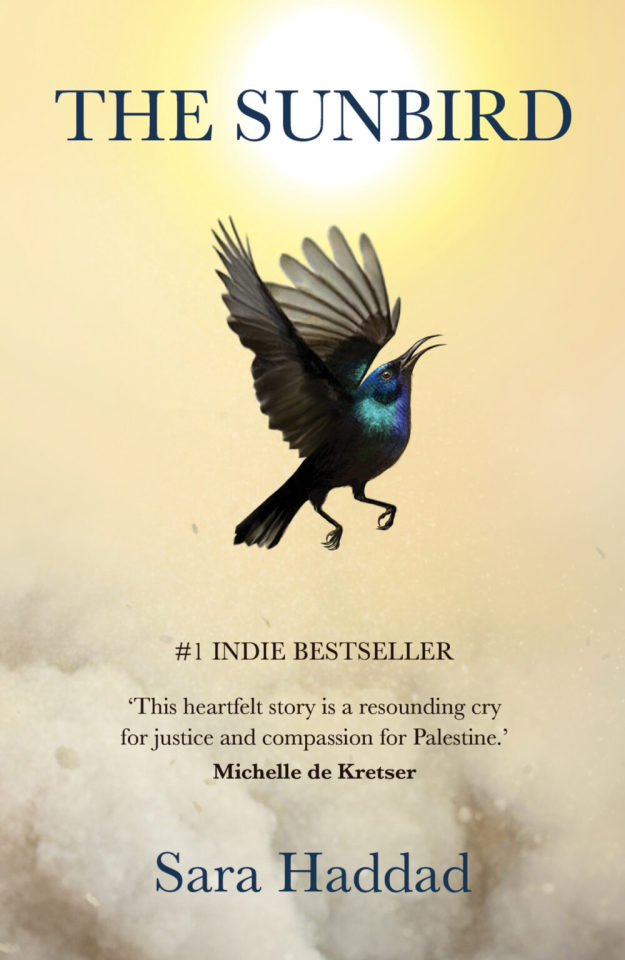
Title: The Sunbird Author: Sara Haddad Finished: 19 February 2025 Rating: 3.5/5
I read this book for an upcoming book club meeting. It was a good short story that got straight to the point.
The book is split between two periods in the main character Nabila’s life—her childhood in Palestine and her elderly years in Sydney, Australia. It is well-written, and Nabila is a likeable character who is easy to root for and empathise with. It is a simple story that highlights the injustices experienced by Palestinian peoples in the establishment and maintenance of the Israeli regime. It also shows how people can find strength and determination through standing up for justice.
The only reason I gave this book a 3.5 instead of 4 is because it’s so short. I wanted to know more about Nabila’s story—what it was like growing up in Palestine, trying to survive, leaving, migrating, adjusting to a new country, what happened to her family, and so on.
I think it’s a testament to an engaging story and well-written character that my only frustration with the novel is that I wanted to spend more time with Nabila and her story.
0 notes
Text
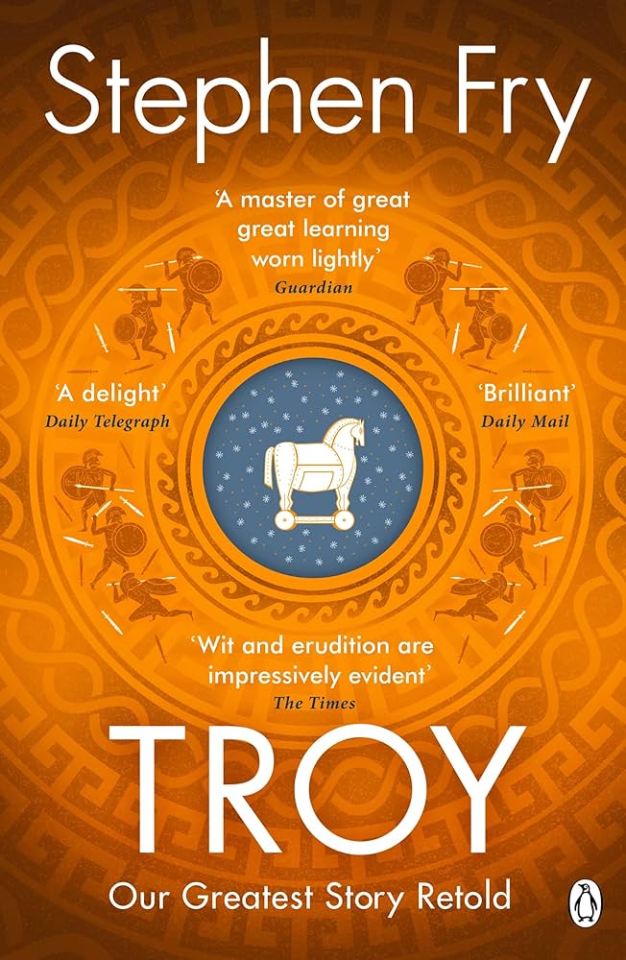
Title: Troy Author: Stephen Fry Finished on: 11 February 2025 Rating: 4/5
This is the third book in Stephen Fry’s series on Greek mythology. Like Mythos and Heroes, I thoroughly enjoyed this modern retelling of the Trojan War. Fry is a master storyteller who modernises the mythology in a highly engaging and accessible way. I appreciate this because it allows people to become acquainted with ancient mythology who might not have otherwise, given that many ancient texts can be quite challenging to read.
The structure of this book is a bit different from the others, as it tells a larger story in a more chronological way—which I found refreshing. Every side story was well integrated, enhancing the overall narrative without feeling disjointed.
Overall, a great read (or listen)!
2 notes
·
View notes
Text
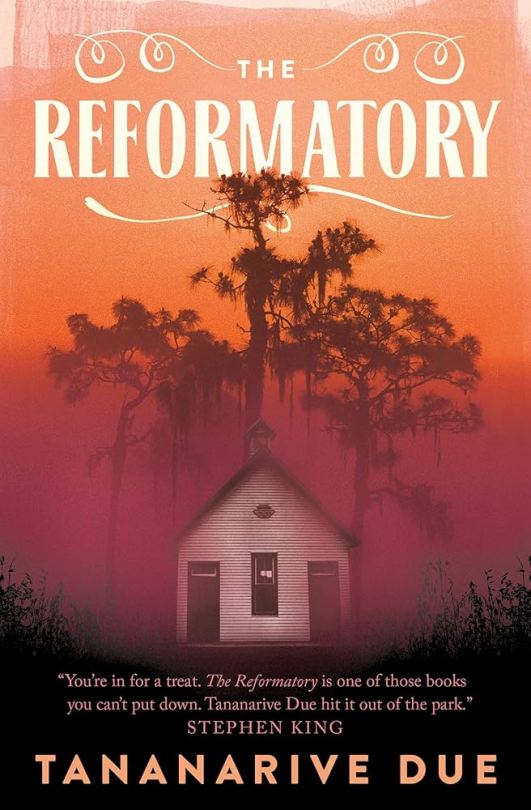
Title: The Reformatory Author: Tananarive Due Date Finished: 11 February 2025 Rating: 3.5/5
I wasn’t sure what to expect from this book, which has been labeled as both historical fiction and horror. Horror isn’t a genre I’m particularly drawn to, so I had my doubts about whether I’d enjoy it. However, the overwhelmingly high Goodreads rating convinced me to give it a try. Ultimately, I found The Reformatory to be an important and compelling read, though I didn’t quite consider it the masterpiece that so many others seem to.
This is a very plot-driven novel, following the personal journeys of a brother and sister, Robbie and Gloria, after Robbie is unjustly sentenced to a boys' reformatory infamous for its horrific abuses—including the deaths of many who pass through its gates. While I enjoyed the plot overall, I found Robbie’s sections significantly stronger and more engaging than Gloria’s. In fact, I think I would have preferred the story to be told almost entirely from Robbie’s perspective, with Gloria’s struggles conveyed through letters or visits instead. Her storyline, while not uninteresting, often felt like it slowed the momentum of the book. I suspect her inclusion was meant to provide a strong female character, but I didn’t feel it was entirely necessary. This is, at its core, a story about the abuse and horrors faced by Black boys and men—and that focus would have been enough. Additionally, Gloria has far more agency than Robbie, and I would have liked to see Robbie come into his own more as a character.
Another issue for me was the pacing. Robbie’s time in the reformatory unfolds over just a week or so, which makes the story feel rushed. Because of this condensed timeline, it’s harder to develop deeper connections with the characters. The loss of Redbone, for example, is undeniably sad—I even teared up when he was being buried—but at the same time, the grief feels surface-level because we barely knew him, and neither did Robbie. If Robbie had spent more time in the reformatory, we could have seen how the environment changed him, how he formed deeper relationships with Redbone, Blue, and the other boys, and how those relationships made his experiences even more harrowing.
Ironically, for a horror novel, the most terrifying elements aren’t supernatural at all but rooted in historical reality—the horrors of the Jim Crow era and the psychopathy of Haddock, the reformatory’s sadistic superintendent. The supernatural aspect comes in the form of ‘haints’—ghosts or spirits—but they aren’t the true source of fear. While some of their appearances create eerie, unsettling moments (which I imagine would be even more intense in a film adaptation), the haints themselves are more sympathetic than monstrous. Blue, for example, may be meddling, but he does so with a purpose: to seek justice for the boys lost to institutional abuse.
Overall, I liked the premise, the characters, and the setting of The Reformatory. It was a good book, but it didn’t quite reach greatness for me. It felt like it had the potential to go deeper, to explore its themes and characters in a more profound way.
1 note
·
View note
Text
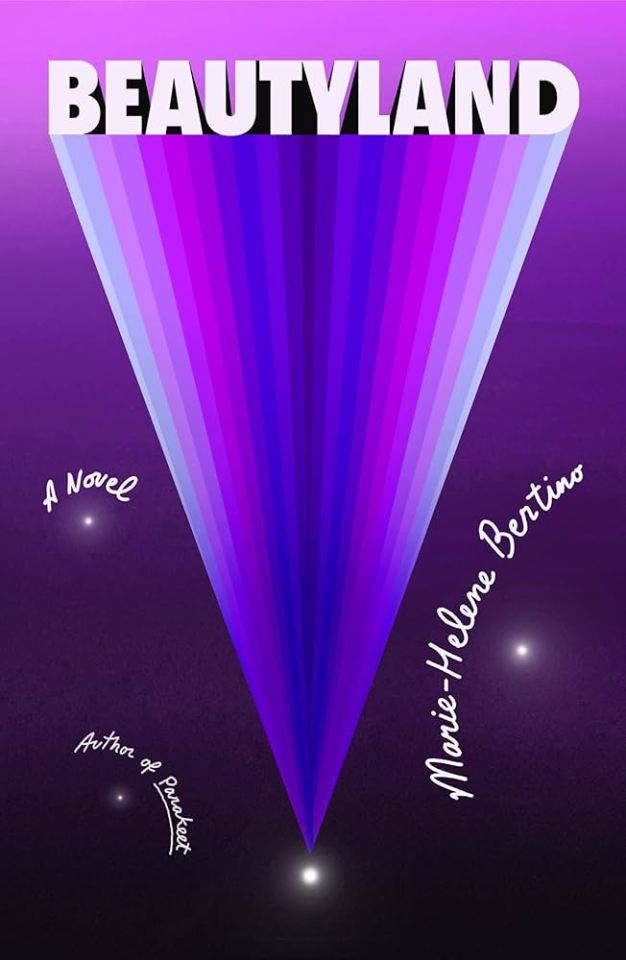
Title: Beautyland Author: Marie-Helene Bertino Date Finished: 7 February 2025 Rating: 4.5/5
I really connected with this book.
While it’s never made explicit, Adina is written in a way that strongly reflects an autistic experience—particularly that of a 'high-functioning' (or level 1) autistic woman. Perhaps this is why I found it so deeply relatable. Beyond that, the novel is simply and beautifully written.
Adina’s reflections, observations, and sense of place in the world mirror my own experiences navigating this complex reality—one that I was born into yet often feels foreign, even alien. As a teenager, I became convinced that my soul was new to this planet, that it had originated elsewhere—in another galaxy, another universe. It’s that deep, unshakable feeling of not belonging: of being a mere observer, watching others, trying to make sense of it all.
Beyond Adina, I found myself drawn to several other characters—her mother, Toni, and Dominic in particular. I’m a character-driven reader, and I love stories where the protagonist is surrounded by people who appreciate and accept them as they are. It was heartwarming to see Adina experience that.
Unlike many, I didn’t read Beautyland as a tragic tale. If anything, it gave me a sense of serenity—reassurance that others move through the world in ways that echo my own. Yes, there’s struggle, confusion, loneliness, and the yearning to belong, but there’s also connection, love, curiosity, and acceptance. The ending, which implies Adina’s departure from this life under the belief that she is “deactivating” as an alien, didn’t feel tragic to me. It felt like a quiet understanding, a peaceful conclusion—a return home.
I loved this book.
0 notes
Text
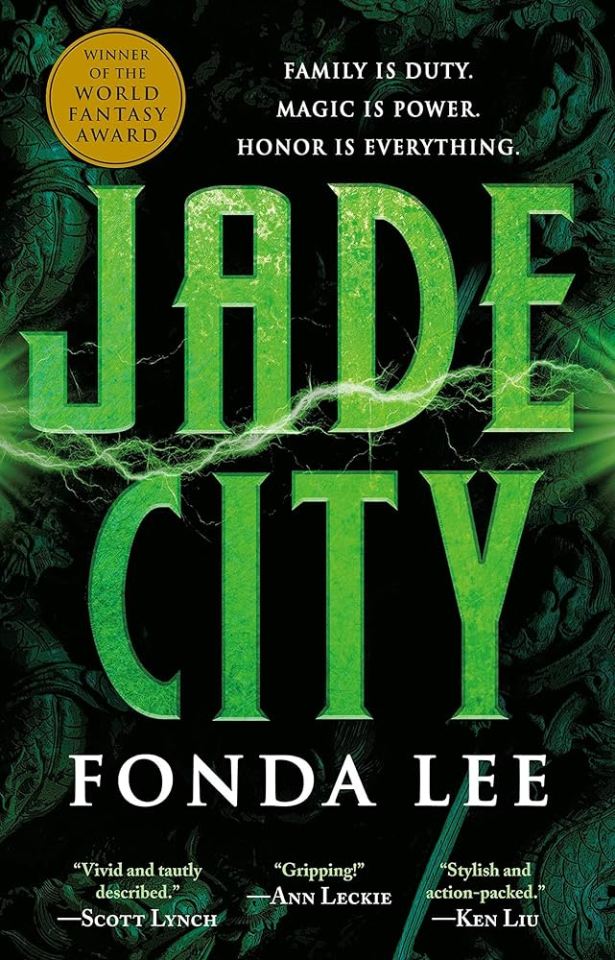
Title: Jade City Author: Fonda Lee Date Finished: 1 February 2025 Rating: 4/5
When I picked up Jade City, I wasn’t sure what to expect. I had heard great things about it online, but the crime family/syndicate aspect was outside my usual reading preferences. That uncertainty carried through the first few chapters, but it didn’t take long before I was completely engrossed and unable to put it down. My overall impression? I will most definitely be reading the next two books in this trilogy.
I’m very much a character-driven reader, and I found myself drawn to several characters in this story. Lan was the first to catch my attention, followed by Shae, Anden, and Wen. Even Ayt, the antagonist, is compelling—I’m eager to see what she does next. The only character I actively disliked was Bero, though I suspect that was by design. I also appreciated the diversity of personalities in the book; I think most readers could find at least one character they resonate with. It speaks to how different qualities and perspectives can shape the choices people make and the paths they take.
This is a highly plot-driven story, with constant action that keeps you hooked. There’s always something happening, making it compelling to see how the characters navigate their challenges. Many of the choices they face feel impossible—situations where there’s no clear right or wrong answer—prompting the reader to reflect on the complexities of morality itself.
Fonda Lee’s skill as a writer is especially evident in how seamlessly she switches between characters and settings without making the narrative feel disjointed. The pacing is fast and dynamic, yet the story remains coherent and easy to follow.
The world-building is also excellent. Having traveled extensively in Asia, I found it easy to visualize the Asian-inspired metropolis where the story unfolds. The setting feels rich and immersive, adding depth to the narrative. Given the book’s cinematic quality, I think this saga has great potential for adaptation—whether as a film, television series, or even a video game.
Overall, Jade City exceeded my expectations, and I’m excited to continue the trilogy. It has also made me quite confident that I would not be well-suited to a life of professional crime or gang wars.
0 notes
Text

Title: Kurangaituku Author: Whiti Hereaka Date Finished: 26 January 2025 Rating: 5/5
Wow—what an amazing and magical book! Kurangaituku has become an all-time favourite for me—I loved everything about it.
Feminist mythical and historical retellings are a popular genre at the moment, and I’ve eagerly immersed myself in this trend, enjoying books like Circe, Clytemnestra, and Kaikeyi. Discovering a retelling set in the Māori world brought me so much joy, and I couldn’t help but love this story. It avoided a common pitfall in some of these retellings: the tendency to make female characters so “perfect” and faultless to justify their actions, make them blameless and counter historical vilification. Instead, Kurangaituku offers a more nuanced portrayal.
Kurangaituku’s story illuminates the suffering many women endure simply because they are women. Yet, she is far from a flawless or wholly sympathetic character. She is complex: capable of rage, brutality, and naivety. She captures a man to gain knowledge by consuming his brain—an act of both curiosity and violence. Indeed, it does not entirely villify Hatupatu either - for if I had been captured and imprisoned by a man, would I too not try to gain his trust so that I might survive, so I might escape? Thus, Kurangaituku is not blameless, but her struggles to understand her place in the world, especially in relation to the Song Makers, make her deeply human and relatable.
The prose in this book was breathtaking. It had a poetic quality that resonated with me, reminding me of the kind of poetry I’ve been drawn to—and even written—myself.
The story delves into metaphysical and existential questions: what it means to be and not be, to exist and not exist, to be alive and dead, human and non-human, or caught in the liminal spaces between these states. Kurangaituku’s confusion and isolation—the inability to be defined or rooted—are deeply moving and relatable.
Before reading the book, I looked up the original myth of Hatupatu and Kurangaituku as part of my own cultural reconnection journey. This enriched my reading experience, as I appreciated how the book reimagined the story while expanding it into something profoundly unique. I particularly enjoyed following Kurangaituku into the underworld, exploring her experiences of “death” and encounters with atua. It was a beautiful way to be introduced to Māori mythology and its richness.
This is a book I want to own, proudly display on my bookshelf, revisit in the future, and lend to others. I’m also excited to read Hereaka’s other works on pūrākau.
2 notes
·
View notes
Text
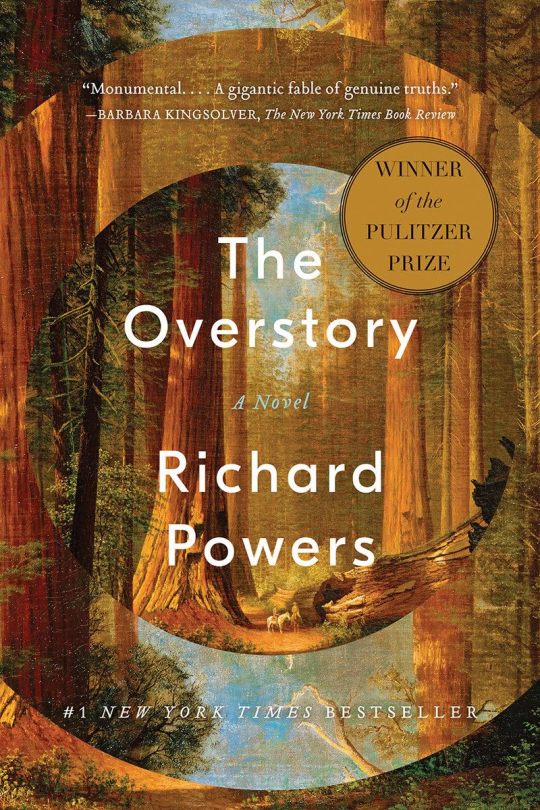
Title: The Overstory Author: Richard Powers Date Finished: 25 January 2025 Rating: 4.5/5
From the moment I started reading this book, I knew I was going to love it, and by the end, that feeling was fully confirmed. Overall, I thought The Overstory was excellent—beautifully written, thought-provoking, and compelling.
The themes—nature and trees, activism and resistance, corporate greed and human hubris, relationality, love, and sacrifice—were powerful and offered much-needed social commentary. At multiple points in the book, I felt inspired and compelled to know more, to act. I looked up local and national environmental organisations, information about deforestation and trees, climate change, and what I could do to try to fix things—even if it is true that humanity might well be doomed. I believe it speaks volumes when a work of fiction has the power to inspire readers toward meaningful action.
The weaving of multiple characters' lives was masterfully done, showcasing Powers' expertise and deep understanding of his craft. I enjoyed each unique plotline, though I was particularly drawn to Patricia Westerford’s story. Each diverse character felt well-developed, with their own histories, journeys, strengths, and flaws adding richness to the narrative.
The prose was exquisite, and it was the first thing that captured me.
This is my first book by Powers, but it certainly won’t be my last. This was a work very much worthy of winning the Pulitzer Prize.
0 notes
Text

Title: I’m Glad My Mom Died Author: Jennette McCurdy Date Finished: 19 January 2025 Rating: 4/5
Jennette McCurdy's memoir is a poignant and unflinching account of surviving an emotionally abusive, controlling, and narcissistic parent. I found myself wanting to reach through the pages to give Jennette a hug—and, quite honestly, I’m glad her mom died too. Not out of malice, but because it seems that her mother's death was the only way Jennette could truly begin to reclaim her life.
This memoir vividly captures the suffocating reality of having a parent who consumes all the air in the room, leaving their child with no sense of self, identity, or autonomy. McCurdy conveys this experience with unvarnished honesty, showing the profound ways such abuse distorts and diminishes a person.
The book is written in a direct, first-person, present-tense style that draws readers into Jennette's world. This narrative choice is both accessible and immersive, helping us understand the subtle, insidious nature of narcissistic abuse. Unlike physical violence, emotional abuse often hides in double meanings and behind closed doors, making it difficult for outsiders to grasp. Jennette's storytelling allows readers to see it from the inside out, making the invisible visible.
The title, while controversial, speaks to an emotion many survivors of abuse may recognise but rarely feel safe admitting: the complicated relief that comes when the source of their suffering is gone when the abuser dies. McCurdy’s bravery in naming and exploring this sensation challenges the stigma surrounding it.
This is a powerful and important memoir that sheds light on the emotional scars of abuse and the resilience required to overcome them. It’s as heartbreaking as it is cathartic.
1 note
·
View note
Text
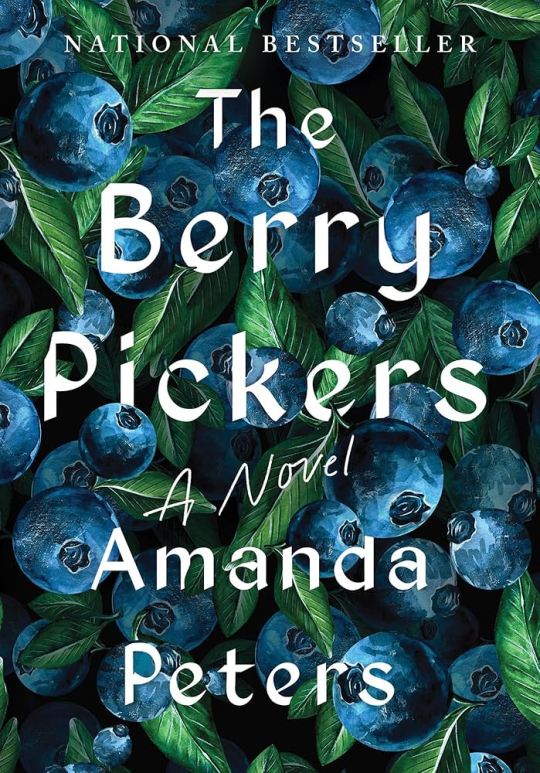
Title: The Berry Pickers Author: Amanda Peters Date Finished: 18 January 2025 Rating: 3.5/5
I read this book within a 24-hour timespan. While I do not have any major complaints, I also feel that the book didn’t quite live up to its fullest potential.
The premise of the story is that a young Indigenous girl, Ruthie, goes missing. We find out very early on that she has been kidnapped. The book touches on many themes, including grief and loss, motherhood, miscarriage, love, domestic violence, and alcoholism. I think it addresses these themes with tenderness and compassion, which I appreciated, even if some of them were only briefly explored.
The narrative alternates between two perspectives: Ruthie/Norma’s and Joe’s, her older brother. I found myself more invested in Ruthie’s perspective than Joe’s, though I can’t quite pinpoint why. Perhaps it’s because I related more to Ruthie’s experiences. As someone who has lived with a parent who had a mental illness and could be quite suffocating and selfish, I found Ruthie’s perspective resonated with me more than Joe’s story of loss, which I haven’t personally experienced.
That said, I did enjoy the family dynamics overall presented in Joe's story. This was very clearly a family that loved and cared deeply for one another. I liked each family member, and I would have also enjoyed more time getting to know them in more depth. I felt it captured some of the intense love that can be found in large Indigenous families.
If I’d been writing this story, I think I would have approached it differently. The pacing felt slow, and the narrative lacked the mystery or tension needed to drive it forward. I would have liked to explore more of Ruthie’s story after she reunited with her family. It would have been fascinating to delve deeper into her process of coming to terms with the grief of being stolen from her family, navigating the love, hurt, and betrayal associated with the people who raised her, and dealing with the challenges of reconnecting with people who are both familiar and estranged. Unfortunately, we only got to see the beginning of this journey, and it felt like a missed opportunity to explore these complexities in greater detail.
At the end of the day, this is more of a personal preference than a critique of the book itself. Overall, it was a tender and thoughtful read, even if it left me wanting more.
0 notes
Text
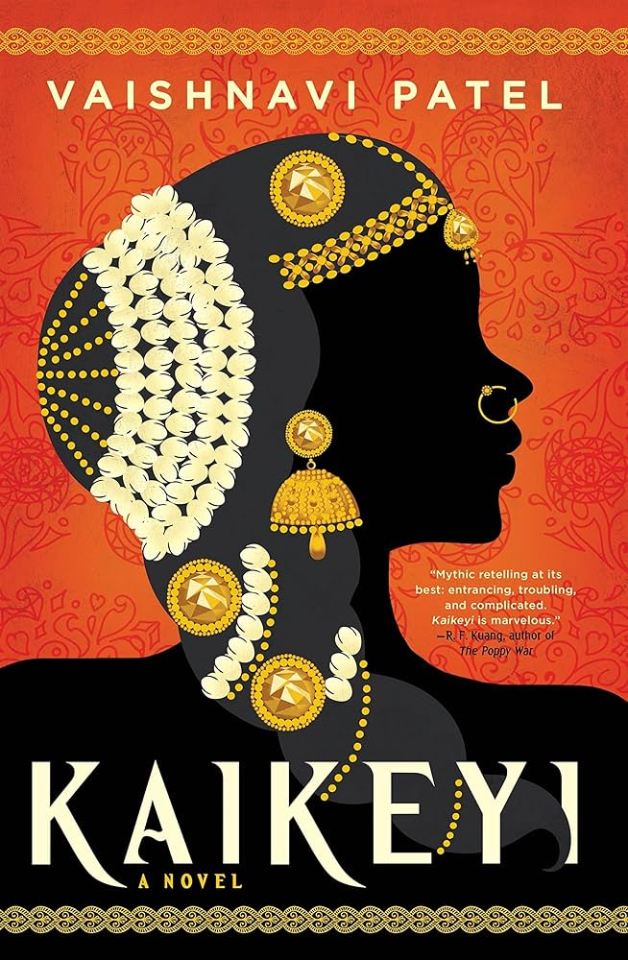
Title: Kaikeyi Author: Vaishnavi Patel Date Finished: 18 January 2025 Rating: 4/5
I am a general fan of the feminist mythical/historical retelling trend that has erupted this past decade. Overall, I thoroughly enjoyed this read.
It was refreshing to be immersed in a new, vibrant culture – as pretty much all of the other books of this type that I have read are based on European myth and history. The world felt rich - both in the natural settings and in the city settings. The plot was also interesting. It felt like something was always happening.
I enjoyed the main character, and I liked experiencing the story through her eyes. She was ambitious, resilient, strategic, smart, and dedicated to creating a more just society. But she was also flawed – she could be selfish, brash, and manipulative – and these flaws made her feel more real. You could understand why she made certain choices, but you could also understand how people could be hurt by her, might see her negatively, and might be unable to forgive her. Beyond Kaikeyi, I also enjoyed multiple other characters, such as Yudhajit, Dasharath, and Kausalya.
I very much appreciated Kaikeyi’s unique “power” and the conceptualisation of that power: the ability to see and influence various threads that symbolically represented people's ties to one another. I thought it was a lovely visual metaphor for human connections.
The novel frames Rama as an antagonist towards the end. My feelings toward him shifted to fear, a sense of threat, and even dislike. I assume this was done so that readers would be less likely to question or resent Kaikeyi for orchestrating his exile and promoting her son’s rule. However, I think the story could have achieved a similar effect if Rama were portrayed as a more sympathetic and nuanced character. We still could have understood – or even agreed with – Kaikeyi’s actions while acknowledging Rama’s complexity and his role as more than a one-dimensional antagonist.
I read some of the reviews of this book, and many people – especially those who are Indian and Hindu – disliked this retelling due to its portrayal of Rama and certain other characters (e.g., a character who is a rapist in the Ramayana being made sympathetic in this retelling). These perspectives have given me a lot to think about regarding cultural sensitivity and reinterpretations of sacred stories.
Overall, I enjoyed this read. Both the book and its more critical reviewers have prompted a desire to one day read the source material, The Ramayana, so I can better understand the original story and draw my own comparisons.
0 notes